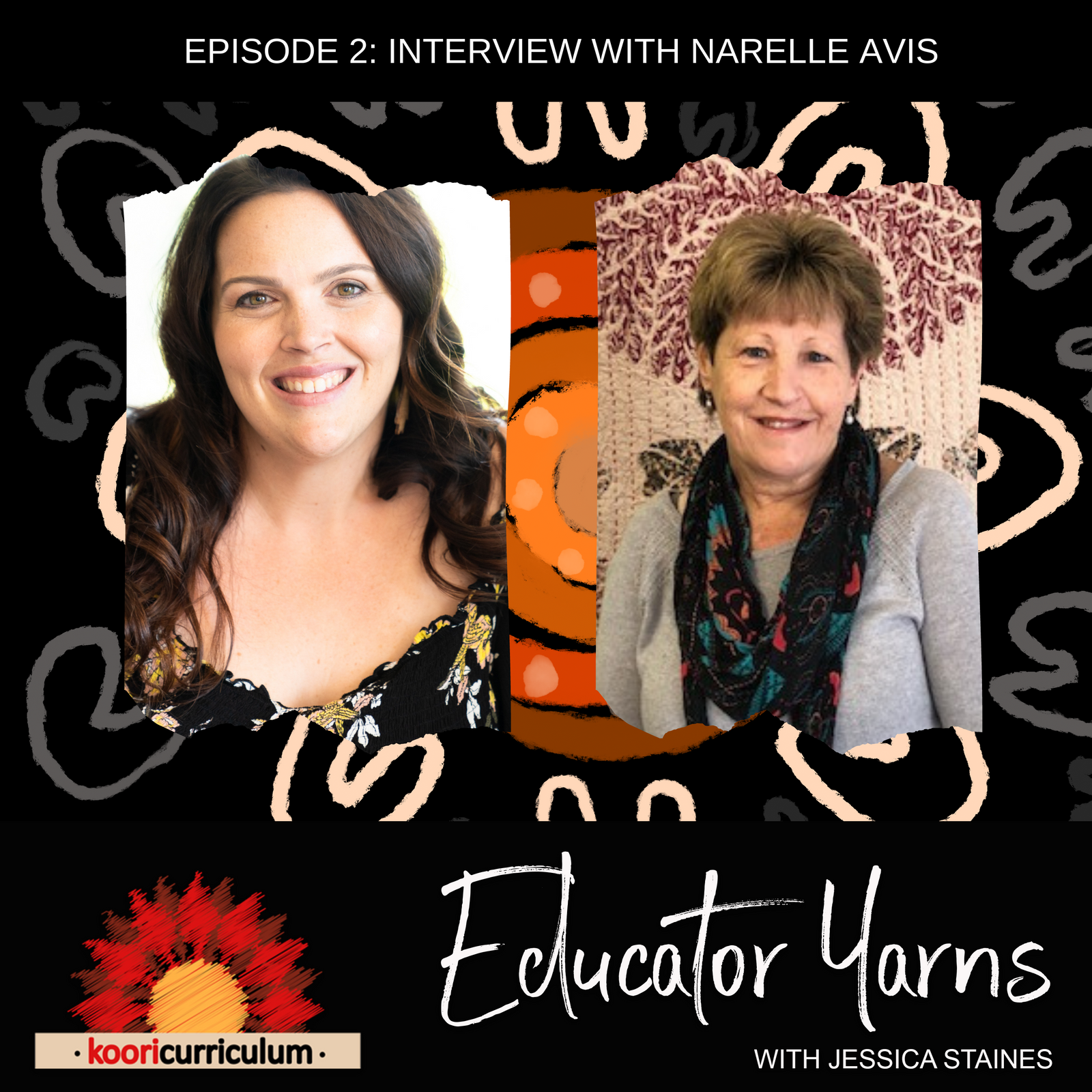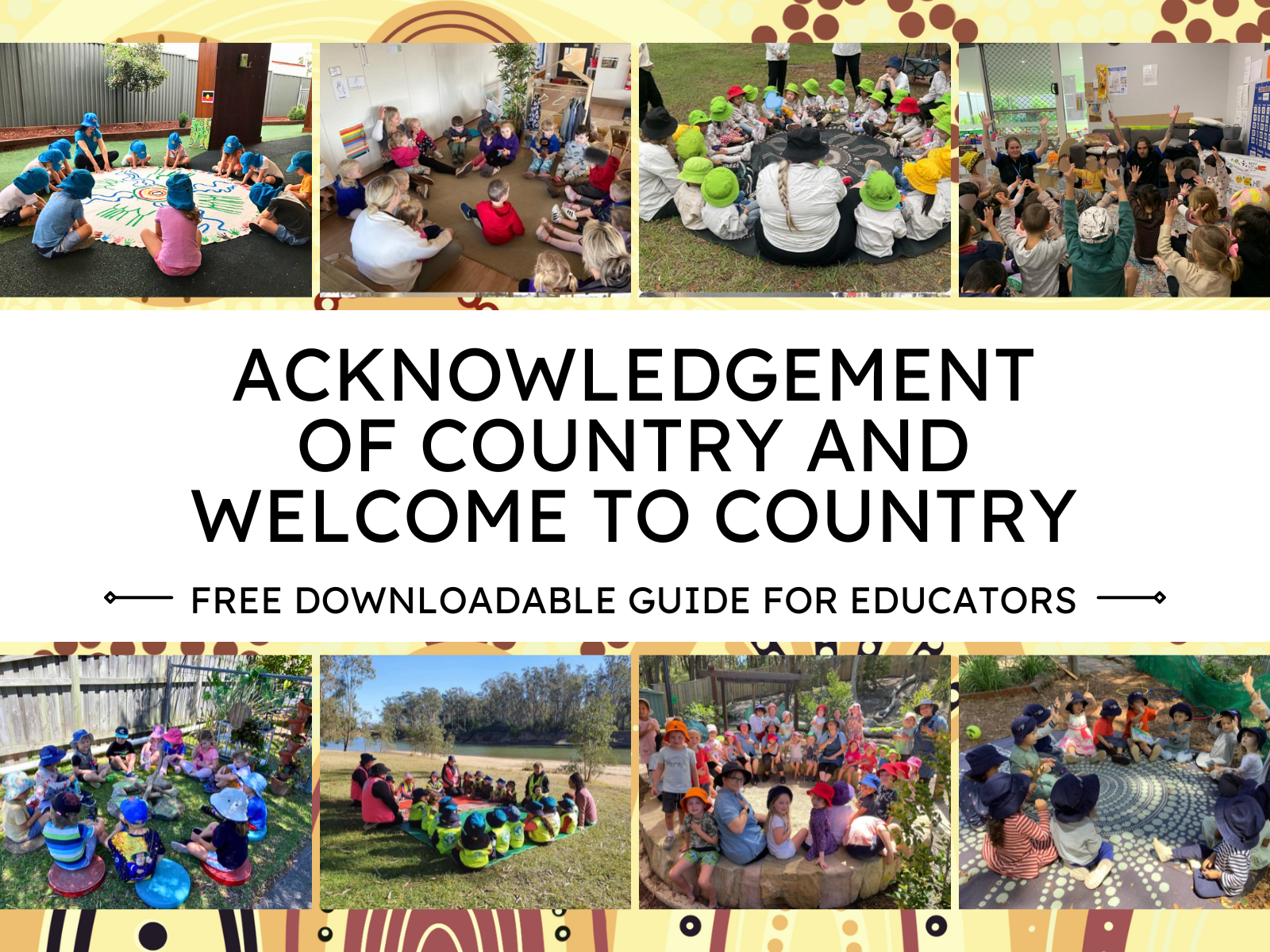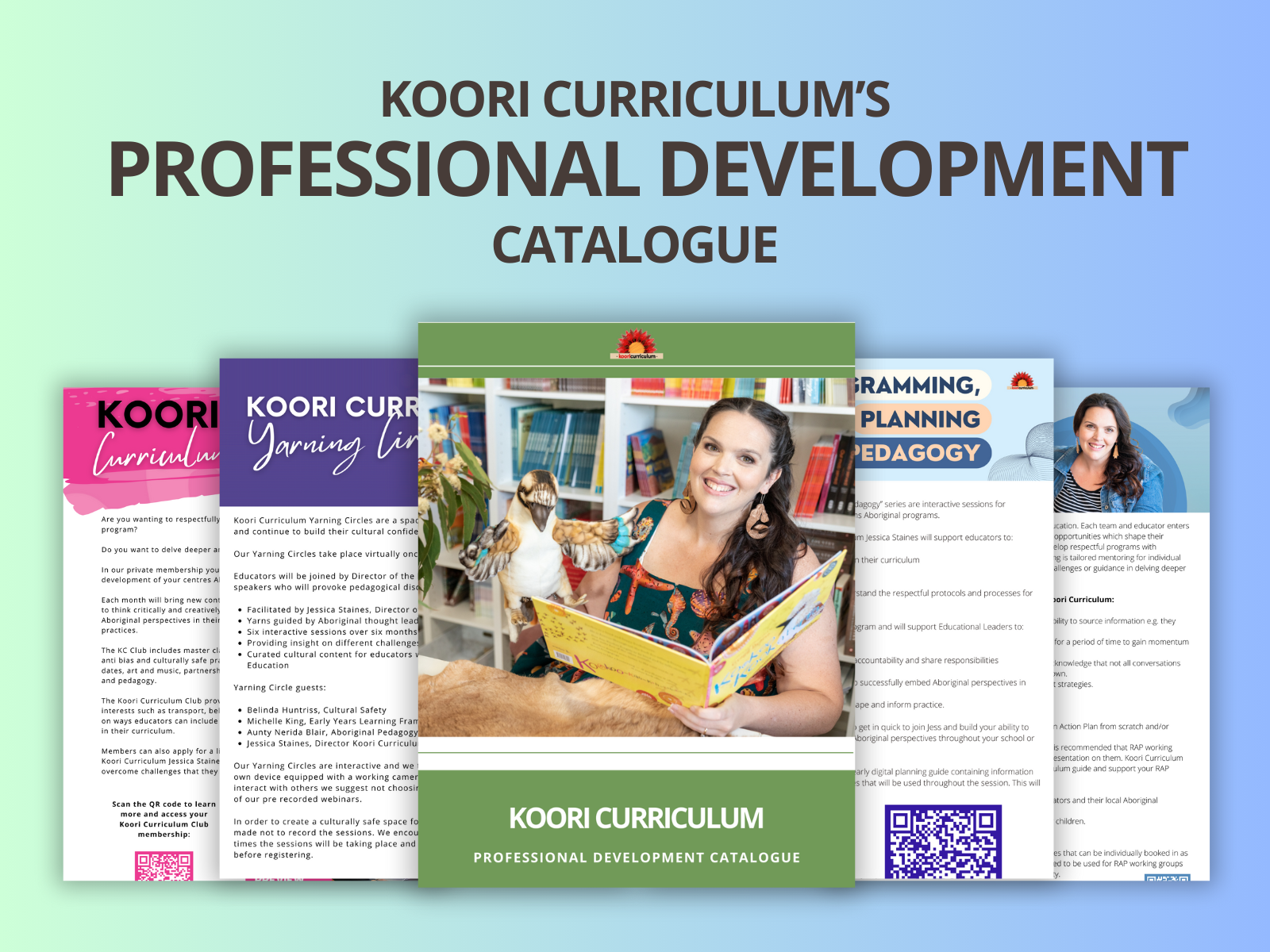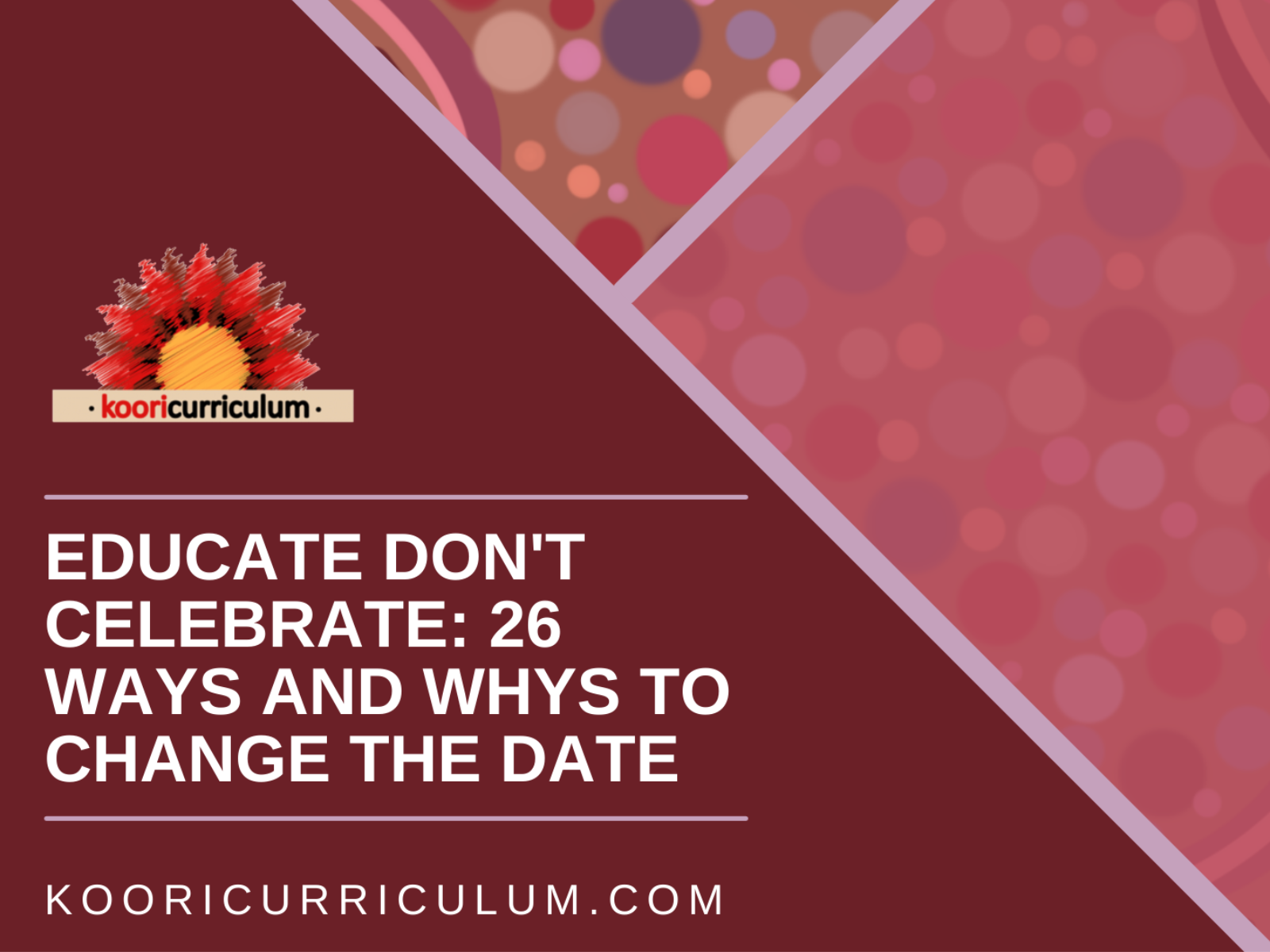
Educator Yarns Season 2 Episode 2: Interview with Narelle Avis
Episode 2: Interview with Narelle Avis
On today’s episode of Educator Yarns, Jessica speaks with Narelle Avis, Director of Cooma North Preschool, on Ngarigo Land in the Snowy Mountains of NSW.
Narelle talks about her journey and the insights learnt in connecting with the local community, the challenges and the rewards of persistence, genuine reflection and the importance of listening when seeking those connections.
Show Notes
Narelle Avis:
The more that you put out there in the community, the more comes back to you.
Jessica Staines:
You only have to scratch at surface to sort of realise there's so much more that we can learn and know.
Narelle Avis:
Put yourself out there in the community. So people know that you're interested in embedding the Aboriginal perspectives in your service and helping educate, and learning more about Aboriginal history and culture. You really have to talk and you really have to listen.
Speaker 3:
You're listening to the Koori Curriculum Educator Yarns with Jessica Staines.
Jessica Staines:
I'd like to acknowledge the Darkinyung People, the traditional owners of the land on which I am recording these podcasts. I pay my respects to their elders both past, present and emerging and pay my respects to all Aboriginal and Torres Strait Islander listeners.
Hi everyone. My name is Jessica Staines, director of the Koori Curriculum. For those of you that aren't familiar with our podcast, season two is all about our new book, Educator Yarns, we're meeting and interviewing with our educator contributors from right around Australia, who will be sharing little snippets of their piece. It will be a combination of stories about why embedding Aboriginal perspectives is so important, how to connect with local community, how to embed Aboriginal perspectives in our programme, how to work with anti-biassed approaches and so much more. So make sure you listen in and enjoy the episode. Bye for now.
Hi everyone. I just want to welcome Narelle Avis, the director of Cooma North Preschool, to our podcast, Educator Yarns, this morning. Thanks so much Narelle for coming back on and catching up. So essentially in this episode were just going to be talking about the challenges of regional preschools, in connecting with the local Aboriginal community, and Narelle's team, I think we met maybe three or four years ago now, three, four, I can't remember.
Narelle Avis:
Three I think.
Jessica Staines:
Yeah, and talking about the changes that you've made in that time, because now you've been able to make some really lovely connections with community, but it hasn't always been easy. Has it?
Narelle Avis:
No, no, it hasn't, but everyone from Ngarigo Country and in the snowy mountains and Cooma. I think that there's lots of challenges being in a regional community that doesn't have a lot of services to go to for support. We don't really have an Aboriginal lands council here, the nearest one is probably about an hour and a half away. And there's not a lot of services that are, Aboriginal specific. So it's been a little bit difficult to have those, get those connections. We also don't have a very large Aboriginal community here. A lot of them don't live locally anymore and they come back on country for celebrations and for, special occasions. So making those connections with community and trying to develop relationships with community and elders has been a little bit of a challenge as well.
Jessica Staines:
Yeah. And I think obviously you share a border with Ngunnawal Country in Canberra. I think, one of the things that I've come to realise when I work with regional services is that, sometimes in urban areas, we sort of have this privilege of when we think of local, we think like a five minute radius around our early learning service, like where can we get to with within five or 15 minutes, but for you guys to get the support and to make connections and build relationships, you were having to travel, sometimes further afield like an hour and a half or so. And when I think about it really like the Braduberry Nation, which is where, what my family is a part of. So my family is originally from Molong and Parks, but the Braduberry Nation is two thirds the size of new South Wales so to get from one end to the other, you can be driving throughout our country for a couple of hours.
Narelle Avis:
Yes.
Jessica Staines:
So it's so local for us doesn't necessarily mean just, the next suburb over or something like that, which I think you found very quickly. So what were some of the first connections that you made when connecting with community?
Narelle Avis:
I'm trying to think. It seems such a long ago and so much has happened, but we had been putting a lot of things out on our Facebook page and we had a local Ngarigo woman get in contact with us and she wanted to talk about some of the projects that we had going. We had some poles that we had decorated, or we'd got decorated by our edgery artist who spent a lot of time in our service because his family grew up here and he went to school here and he came into the project with the children. And she wanted to talk about that and know a little bit more about that.
Jessica Staines:
Yeah, and I think one of the issues with that potentially was is that there is this idea that if we're doing like an art mural or an artwork, that it would be great if that went to a local, Aboriginal artist from the country on which your services is based, but I think, that was her or potentially could have been one of her perspectives of it, which we can say the point. But I think also, like I know even in Sydney where I am, Sydney is such a multicultural community, with lots of cultures but even within Aboriginal cultures that are here. So yes, like the Gadigal people are the traditional owners of the land on which I'm meeting on today. But there are also, like I'm Wiradjuri and my parents live 10 minutes from where I am on Gadigal country and I was born and raised here.
So the Aboriginal people in your community aren't necessarily from that country, which is why, when we look at embedding Aboriginal perspectives in our programme, we have to strike that balance between local perspectives, urban, regional, traditional, and contemporary to be really holistic. So I think you do both, but one is not exclusive of the other in any way.
Narelle Avis:
Yes.
Jessica Staines:
I know that you are able to find like some compromises with that. So with community and so forth so that everyone felt respected and heard and valued and a part of that process. But those community connections can sometimes be really, really tricky because, you try with all of your might to make connections and, you only know what you know, and you can only do what's within your ability with the relationships and connections that you've been able to find. And you spent such a long time trying to make those connections, but that does seem like a long time ago now when those first community partnerships emerged. And I know you were just sharing with me that you've made some other connections now with local artists and a local linguist. Did you want to talk a little bit about that?
Narelle Avis:
Yes, yes we have, and I think, the more that you put out there in the community, the more comes back to you and people hear about what we've been doing here. And we also feel more confident approaching other people. So I have made contact with Professor Jakelin Troy, who is the director of Aboriginal and Torres Strait Islander research at the University of Sydney and her interest, her field is, she's into languages, and at the moment she's documenting, describing and reviving indigenous languages. And she is a Ngarigo woman and I've made a connection with her and she's going to come to the preschool early next year and have a Yarn with us, about maybe collaborating with us and the children on a project that we might be able to work together. So that's really exciting. And the artist is Gail Neuss, and she's an Ngarigo artist. And I saw some of her art in our local visitors centre and sent her an email. And she's pretty excited that, we would like our children at this age to learn more about the history and culture of the local Aboriginal people.
So she thought that was really exciting. And she's going to come and do some work with us in the new year as well.
Jessica Staines:
I had you had relationships with Sal Lavallee from Bogong Moth Creations in the past.
Narelle Avis:
Yes. I met her at a NAIDOC exhibition at the local [inaudible 00:09:52] gallery here. And we had a few email conversations back and forth and she was going to come and visit us when she came to town. But COVID and everything, bushfires, COVID, everything happened this year and that hasn't got off the ground as yet, but I'm always going to keep those lines of communication open and, welcome her to visit anytime as well.
Jessica Staines:
Yeah, That's fantastic. And I think that you've just made these relationships over time.
So how did you come across Jakelin Troy, and how did you reach out to her?
Narelle Avis:
I saw some of her posts on Facebook and I private message to her, and I introduced myself and talked about our service and what we've been doing and in a message. And luckily for me, she was in between meetings at the time and she gave me a mobile number and said, give me a call now. So that was really exciting. I had a chat with her, and also her mother who is 92. And they just told me so much about, some of the local history and some of the local language. So that was really exciting.
Jessica Staines:
Yeah, I think I was shocked when you said that you had managed to get a hold of Jakelin, because Professor Jakelin Troy is a highly sought after woman. She's an amazing linguist and has done so much for the revitalization and preservation of Aboriginal languages, and not just her own mother tongue, but in the Sydney area.
So in the Gadigal community, she's also developed a dictionary called the Sydney Basin, Aboriginal languages dictionary, which is a free resource it's accessible online to be downloaded and it's also been published. I met her by chance at a referenced group that we both a part of it about a year ago now. And I think she's an incredible woman, and people like that, it doesn't matter how busy they are with community things and especially when working with children, I think they really value the importance of what you're trying to do and I find that sometimes the busiest people are the most generous with their time. So it's lovely that you've been able to make that connection with her, and I can't wait to see the project that unfolds between you and Professor Jakelin, because she's amazing. So that's, to me that's like winning the lotto.
Narelle Avis:
I think I pretty much lucked out in the timeframe that when I messaged her, she was just between a couple of zoom meetings. She was very generous with her time and her knowledge and it was, I could have talked to her for hours, but unfortunately she had to go on to another meeting, but I really look forward to catching up with her and the rest of the staff are really excited to talk to her when she comes our way.
Jessica Staines:
Yep. And so can I ask Narelle, what do you think the hardest thing has been for you to make those connections with community? What has been your biggest challenge?
Narelle Avis:
I guess, finding people who are able to share their knowledge. And as I said before, there's not a lot of local Ngarigo People that live on country. And when those people that do, they're pretty sought after as well in the community and lots of people want to engage with them. So I think that's been a little bit tricky.
Jessica Staines:
Yep. And what piece of advice would you give to other regional preschools like yourself who are just starting to think about how they can make connections with community? What would you suggest they do as a starting point?
Narelle Avis:
Keep trying, and never give up and just be brave and send those emails. Ring your local council, find out who you can contact, put yourself out there in the community so people know that you're interested in embedding Aboriginal perspectives in your service, and helping educate and learn a bit more about Aboriginal history and culture. Because when people hear and see that you're trying, then lots of community members feel more willing to help you as well.
Jessica Staines:
Yeah. And I think, cause they can say that you're genuinely trying to do the right thing. So, I think that's one of the things that has been great about what your team are doing is that you are so generous as well with what you share on social media, on your Facebook page of different experiences that you put out. Like we were just talking earlier about what you do during NAIDOC week and creating that sort of wall of fame along, your front fence, of profiles of different indigenous influential people, past and present and so forth. That the children are connected too, and educators have heard about and learn about and so forth. And that those are great ideas that you're sort of putting out there into community.
And I think therefore when something doesn't sit right, so potentially like when the poles were painted by an Aboriginal person, but not from Ngarigo country, that community are more willing to sort of have conversations and find a resolution towards it, because they can see that there's that underlying respect, that whilst potentially we make mistakes or we don't always go about things the right way I find that community most of the time, they can tell people that are genuine and people that what we would say Gammon, and they want the same goal just like Jakelin, like she wants the kids to grow up knowing the mother tongue of the country on which they are living on. So we all want the same goal at the end the day.
Narelle Avis:
Yeah, I think the idea is, and we certainly learned that during the pole project is you really have to talk and you really have to listen and, respect different perspectives and, just try and explain why you're doing what you're doing. And if someone says to you, well that's not right, then you need to come to a different path, I guess. Because you also have to respect the people that have been working on that project for such a long time, and that was, Peter Swain, who's the oratory artist. He'd spent a lot of time with the children working on that project, but we also had to take into account, the local Ngarigo view that, they didn't really appreciate what the project was about until we had a conversation and we came to a compromise that has worked.
Jessica Staines:
Yeah, that's right. And I think sometimes there's a lot of that give and take and having open communications so that everyone can really understand each other's points of view. And it's not always easy and it's not always comfortable to have those conversations, but I think when people feel like they've been heard, that also goes a long way to building that trust in relationships. Whereas, when those opinions, it would have been really challenging for you to think like, you already had planned what would happen, and then you had to sort of deviate from that and come up with a new way of going about things. But, the whole idea of doing this project was that there would be like a signal, a symbol of respect to the local Aboriginal community in your yard. So therefore we need to make sure that whatever we're putting out there, is respectful of their perspectives and their point of view.
So, and I think, you spoke about that quite eloquently in your piece that you put together for Educator Yards. And yeah, I also know that we talked, or I talked about the use of poles and making sure that people understand that these are story poles and it's contemporary in that totem poles aren't a part of our culture and so forth, but that all comes back to the research that you guys did initially, at the beginning of those projects and developing that artist in residency idea. So, yeah. Is there anything else Narelle that you wanted to share about your preschool and your team?
Narelle Avis:
Yes. Look, I think that, when you starting off on this process, you really have to have these conversations with the people that you work with, and not everyone is going to be at the same space as everyone else, but you really have to, work together and talk as a team. And I guess with us, we're lucky, one of our advantages was that, lots of us have worked together for a long time and we could have some really open and honest conversations and that changed a lot of opinions. There was a lot of talk, and we had to start right at the beginning there and we had to change things, the policies and procedures at preschool as well. We had to start with our philosophy, so that was a really good starting ground for us.
Jessica Staines:
Yeah. And I think laying that foundation and spending that time talking about the different relationships and experiences and perspectives within your team, it really created this space that everyone was starting from the same position of this openness. Within the team and potentially challenging any biases that exist within there, because I think many Australians, have inherited biases whether they're conscious biases or subconscious biases, from their families and how they were brought up, and even from the media, I guess. The media has a big role to play in the perceptions of indigenous Australians. So, getting that all out at the beginning and then I know that, when I came to work with your team, they're really, they're so passionate about what they do and they take so much pride in the experiences that they put out, that there was this real, I don't know, like dedication.
And I think that also comes through with your perseverance in hunting down community connections and so forth. But it's not like there was this project idea for a couple of months where you were looking at ways to include Aboriginal perspectives. This has been a long-term commitment that your whole team has made, to really privilege Aboriginal perspectives in their programme and practise. So I think taking things slow at the beginning and having those conversations does a lot in setting the scene to make sure that whatever changes are made, are sustained and meaningful across your whole team. Rather than just one or two people taking it on as an interest or something like that.
Narelle Avis:
Yes, absolutely. I think that's one of the advantages of being a pretty strong team is that those conversations were always respectful and it was really quite a long process. It's really taken years to get to the point where we are now.
Jessica Staines:
Yeah. And I think sometimes, often when I meet with teams, they really want to know, how to include Aboriginal perspectives in play spaces and children's interests and so forth. Which I understand, but what I sort of feel is that all of that, you can Google that on Pinterest.
That to me is not the important part, the important part is what's going on intrinsically within you, and whether or not you understand and value the importance of including Aboriginal perspectives and understand why they're so important. And I often say to people, it doesn't matter, how basic a table top experience is, if you know why you were doing what you were doing, then it's not tokenism. To the other end of the scale, it doesn't matter how aesthetically pleasing, you can make a tabletop experience look that celebrates culture. But if you don't know why you're doing what you're doing, then it's just window dressing. There's no depth within that, because you're just doing it to tick a box. So what you put out on a table for children, really isn't the indicator for me, whether it's tokenistic or meaningful and respectful, it's about what's going on within the educator, in their thinking and their understanding, that really indicates whether the services culturally safe in the programme is like truly privileging Aboriginal culture in their programme.
And I know that it's taking your team a long time to get there and not, not a long time to get there in terms of like their attitudes and bias, but it wasn't a quick process to make these connections or get the resources or find Aboriginal artists in residents or anything. It's something that you've consistently worked towards over the last few years.
Narelle Avis:
It's not only been a really amazing professional journey for us as a team, it's been quite personal. So, we've really educated ourselves and we've learnt so much through conversations and research and just educating ourselves. That we are at a space where we feel a lot more confident in doing what we're doing.
Jessica Staines:
Yeah. Yep. Well, well done. And thank you again for jumping on Educator Yarns and giving us an update of what's happening at Cooma North preschool, and for contributing to our book, Educator Yarns, and sharing your team's journey, that you've undergone and all the milestones along the way and the challenges that you've had.
I really appreciate it, and I think a lot of your story will be really relatable to services in regional areas where not everything is just so instant down the road, five minute walk or whatever it might be. That it's a little bit more of a manoeuvre to find those connections.
So thanks Narelle for being brave and sharing and coming back on again. I really appreciate it.
Narelle Avis:
Thank you for having me and I look forward to hearing and seeing the book and seeing all the experiences that other services have had too.
Jessica Staines:
Yeah. The good one.
I hope that you enjoyed this episode and had a great little sneak-peak between the pages of our new book, Educator Yarns. If you'd like to ask questions or connect with me, best to join our Facebook group, the Koori Curriculum Educator Community, which is free for all of our listeners and members.
Join me next episode, be yarning with Sue Motley director of Armadale Preschool, about trauma informed practise, two-way learning and nature play in pedagogy. This is an episode not to be missed.



